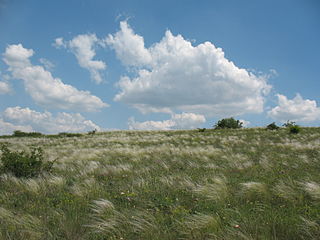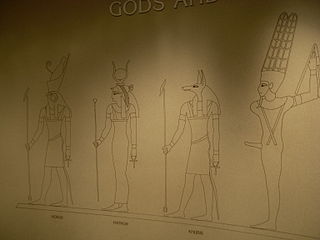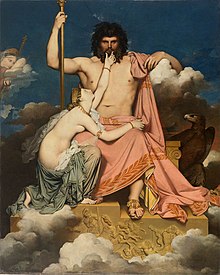
Indra is the king of the devas and Svarga in Hinduism. He is associated with the sky, lightning, weather, thunder, storms, rains, river flows, and war.

Hindu mythology is the body of myths attributed to, and espoused by, the adherents of the Hindu religion, found in Sanskrit texts such as the Vedic literature, epics like Mahabharata and Ramayana, the Puranas, and mythological stories specific to a particular ethnolinguistic group like the Tamil Periya Puranam and Divya Prabandham, and the Mangal Kavya of Bengal. Hindu myths are also found in widely translated popular texts such as the fables of the Panchatantra and the Hitopadesha, as well as in Southeast Asian texts.
Dyaus or Dyauspitr is the Rigvedic sky deity. His consort is Prthvi, the earth goddess, and together they are the archetypal parents in the Rigveda.

Stribog is a god in Slavic mythology found in three East Slavic sources, whose cult may also have existed in Poland. The sources do not inform about the functions of the god, but nowadays he is most often interpreted as a wind deity who distributes wealth.

Svarog is a Slavic god of fire and blacksmithing, who was once interpreted as a sky god on the basis of an etymology rejected by modern scholarship. He is mentioned in only one source, the Primary Chronicle, which is problematic in interpretation. He is presented there as the Slavic equivalent of the Greek god Hephaestus. The meaning of his name is associated with fire. He is the father of Dazhbog and Svarozhits.

Proto-Indo-European mythology is the body of myths and deities associated with the Proto-Indo-Europeans, speakers of the hypothesized Proto-Indo-European language. Although the mythological motifs are not directly attested – since Proto-Indo-European speakers lived in preliterate societies – scholars of comparative mythology have reconstructed details from inherited similarities found among Indo-European languages, based on the assumption that parts of the Proto-Indo-Europeans' original belief systems survived in the daughter traditions.

Ushas is a Vedic goddess of dawn in Hinduism. She repeatedly appears in the Rigvedic hymns, states David Kinsley, where she is "consistently identified with dawn, revealing herself with the daily coming of light to the world, driving away oppressive darkness, chasing away evil demons, rousing all life, setting all things in motion, sending everyone off to do their duties". She is the life of all living creatures, the impeller of action and breath, the foe of chaos and confusion, the auspicious arouser of cosmic and moral order called the Ṛta in Hinduism.

Deva means "shiny", "exalted", "heavenly being", "divine being", "anything of excellence", and is also one of the Sanskrit terms used to indicate a deity in Hinduism. Deva is a masculine term; the feminine equivalent is Devi. The word is a cognate with Latin deus ("god") and Greek Zeus.

*Dyḗus, also *Dyḗus ph₂tḗr, is the reconstructed name of the daylight-sky god in Proto-Indo-European mythology. *Dyēus was conceived as a divine personification of the bright sky of the day and the seat of the gods, the *deywṓs. Associated with the vast diurnal sky and with the fertile rains, *Dyēus was often paired with *Dʰéǵʰōm, the Earth Mother, in a relationship of union and contrast.
Comparative mythology is the comparison of myths from different cultures in an attempt to identify shared themes and characteristics. Comparative mythology has served a variety of academic purposes. For example, scholars have used the relationships between different myths to trace the development of religions and cultures, to propose common origins for myths from different cultures, and to support various psychoanalytical theories.

Armenian mythology originated in ancient Indo-European traditions, specifically Proto-Armenian, and gradually incorporated Hurro-Urartian, Mesopotamian, Iranian, and Greek beliefs and deities.

The Ashvins, also known as the Ashvini Kumaras and Asvinau, are Hindu twin gods associated with medicine, health, dawn, and the sciences. In the Rigveda, they are described as youthful divine twin horsemen, travelling in a chariot drawn by horses that are never weary, and portrayed as guardian deities that safeguard and rescue people by aiding them in various situations.

The Divine Twins are youthful horsemen, either gods or demigods, who serve as rescuers and healers in Proto-Indo-European mythology.
Deus is the Latin word for "god" or "deity". Latin deus and dīvus ("divine") are in turn descended from Proto-Indo-European *deiwos, "celestial" or "shining", from the same root as *Dyēus, the reconstructed chief god of the Proto-Indo-European pantheon.

Polytheism the belief or worship of more than one god. According to Oxford Reference, it is not easy to count gods, and so not always obvious whether an apparently polytheistic religion, such as Chinese Folk Religions, is really so, or whether the different apparent objects of worship are to be thought of as manifestations. Polytheistic belief is usually assembled into a pantheon of gods and goddesses, along with their own religious sects and rituals. Polytheism is a type of theism. Within theism, it contrasts with monotheism, the belief in a singular God who is, in most cases, transcendent.
Deipaturos was a deity worshipped in ancient times as the Sky Father in the region of Tymphaea.

Ancient Iranian religion or Iranian paganism was the ancient beliefs and practices of the Iranian peoples before the rise of Zoroastrianism. The major deities worshipped were Ahura Mazda and Mithra from Iran to Rome, but Atar was also worshipped, as names of kings and common public showing devotion to these three exist in most cases. But some sects, the precursors of the Magi, also worshipped Ahura Mazda, the chief of the Ahuras. With the rise of Zoroaster and his new, reformatory religion; Ahura Mazda became the principle deity and the Daevas were relegated to the background. A lot of the attributes and commandments of Varuna, called Fahrana in Median times, were later attributed to Ahura Mazda by Zoroaster.
*Dʰéǵʰōm, or *Pl̥th₂éwih₂, is the reconstructed name of the Earth-goddess in the Proto-Indo-European mythology.

Zojz is a sky and lightning god in Albanian pagan mythology. Regarded as the chief god and the highest of all gods, traces of his worship survived in northern Albania until the early 20th century, and in some forms still continue today.
The Dieva Dēli are heavenly beings depicted as the sons of the sky-god Dievs in Latvian mythology.













